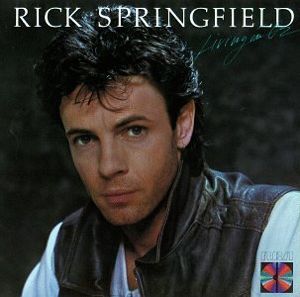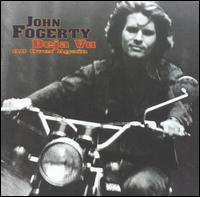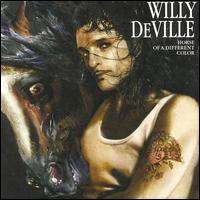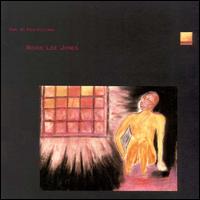
Shortstop is the second album by the American singer-songwriter Sara Hickman, released in 1990.

Blood Red Cherry is the fourth studio album by Canadian singer-songwriter Jann Arden, released in 2000.

Loup Garou is an album released in 1995 by Willy DeVille. First released in Europe in 1995 on the EastWest label, it was released the following year in the United States on the Discovery label. It was recorded in Los Angeles and produced by John Philip Shenale, who also produced DeVille’s Backstreets of Desire album.

Willy DeVille was an American singer and songwriter. During his thirty-five-year career, first with his band Mink DeVille (1974–1986) and later on his own, DeVille created original songs rooted in traditional American musical styles. He worked with collaborators from across the spectrum of contemporary music, including Jack Nitzsche, Doc Pomus, Dr. John, Mark Knopfler, Allen Toussaint, and Eddie Bo. Latin rhythms, blues riffs, doo-wop, Cajun music, strains of French cabaret, and echoes of early-1960s uptown soul can be heard in DeVille's work.

Living in Oz is the seventh studio album by Australian rock musician Rick Springfield, released on 30 March 1983, by RCA Records. The album was quickly certified platinum in America.

Chemistry is the second solo album by singer Johnny Gill. It was released on April 22, 1985.

Deja Vu All Over Again is the sixth solo studio album by John Fogerty. It was released in 2004, seven years after his previous studio album Blue Moon Swamp. Originally issued by DreamWorks Records, it was reissued by Geffen Records after it absorbed DreamWorks.

Coup de Grâce is the fourth album by the rock band Mink DeVille, released in 1981. The album represented a departure for the band, as frontman Willy DeVille dismissed the only other remaining original member of the band, guitarist Louis X. Erlanger, and hired Helen Schneider's backup band to record the album. Moreover, the album was recorded for Atlantic.

Miracle is an album by Willy DeVille. Recorded in 1987, it was the first album that Willy DeVille recorded under his own name. Prior to Miracle, DeVille recorded six albums with the band Mink DeVille, the last four of which were really solo albums by Willy DeVille in that no members of the original band played on the four albums.

Victory Mixture is a 1990 album by Willy DeVille. The album consists of cover versions of New Orleans R&B and soul classics by DeVille’s musical idols. Trouser Press said about the album, “A rootsy covers collection, Victory Mixture provides a welcome antidote to Miracle's misguided modernity, making the most of the singer's relocation to New Orleans with backup from such local legends as Allen Toussaint, Eddie Bo and Dr. John.”

Willy DeVille Live is a live recording of Willy DeVille and the Mink DeVille Band. It was recorded on June 16–17, 1993 at The Bottom Line in Greenwich Village, New York City, and in October 1993, at the Olympia Theatre in Paris. It was released in Europe on December 1, 1993 in Europe by the French label Fnac Music and re-issued in 2012 under title Live in Paris and New York.

Big Easy Fantasy is an album by Willy DeVille and the Mink DeVille Band. It was released in Europe on the French New Rose label in 1995. The album is a mixture of studio tracks and concert recordings made in New York and Paris. The "big easy" of the album's title refers to New Orleans. As the album cover says, the inspiration for the album was "Jump City, the Crescent City, the city that care forgot, New Orleans...The Big Easy!" All songs on the album are standards by New Orleans musicians or are original compositions by Willy DeVille about some aspect of New Orleans.

Horse of a Different Color is a 1999 album by Willy DeVille. The album consists of original compositions and remakes of traditional Black music titles such as Fred McDowell's “Going over the Hill,” and Andre Williams' "Bacon Fat."

Crow Jane Alley is an album by Willy DeVille. It was recorded in 2004 in Los Angeles. For this album, DeVille was joined by members of the Chicano rock band Quetzal, David Hidalgo of Los Lobos, and Peruvian Afro-Cuban jazz drummer Alex Acuña, among other prominent musicians. Crow Jane Alley was produced by John Philip Shenale, the third album Shenale produced for DeVille.

Pistola is the last album by Willy DeVille, released on Mardi Gras day 2008 as a nod to DeVille's musical roots in New Orleans. The album was recorded in Los Angeles with Brian Ray, Lon Price, The Valentine Brothers, and other musicians who had played with DeVille for years. For this album, DeVille borrowed bassist Davey Faragher and drummer Pete Thomas from Elvis Costello's backup band, the Imposters. John Philip Shenale produced the album, his fourth production effort for Willy DeVille.

The Truth About Men is the eighth studio album by American country music artist Tracy Byrd. Released in 2003 as the third and final album for RCA Nashville, it features the singles "The Truth About Men", "Drinkin' Bone", and "How'd I Wind Up in Jamaica". Before its release, Byrd charted in the country top 40 with the single "Lately ", which does not appear on the album.

House of Hope is the second album by American singer/songwriter Toni Childs, released in 1991. It was Childs' second and final album for A&M.

Girl at Her Volcano is a 10" or 12" vinyl EP consisting mainly of cover versions, and the third release by musician Rickie Lee Jones.
John Philip Shenale is a Canadian composer, arranger, musician and producer based in Los Angeles.

Thin Line is the fourteenth studio album by country singer Billy Ray Cyrus, and his second on own record label Blue Cadillac Music. It was released on September 9, 2016. The album peaked at #49 on the Country Charts.



















